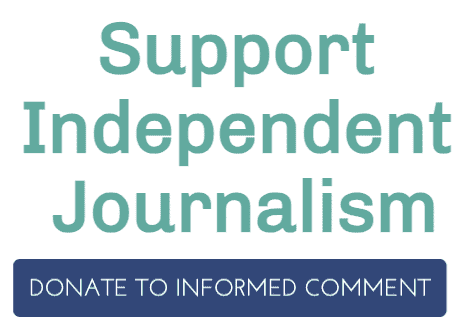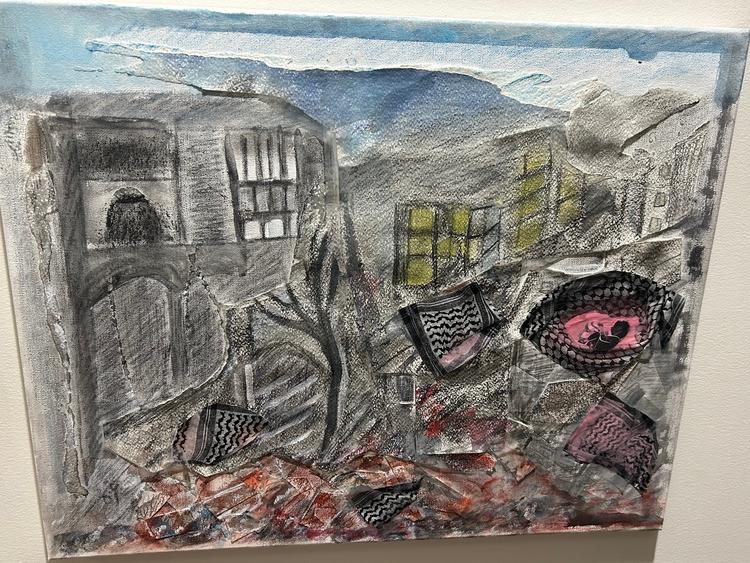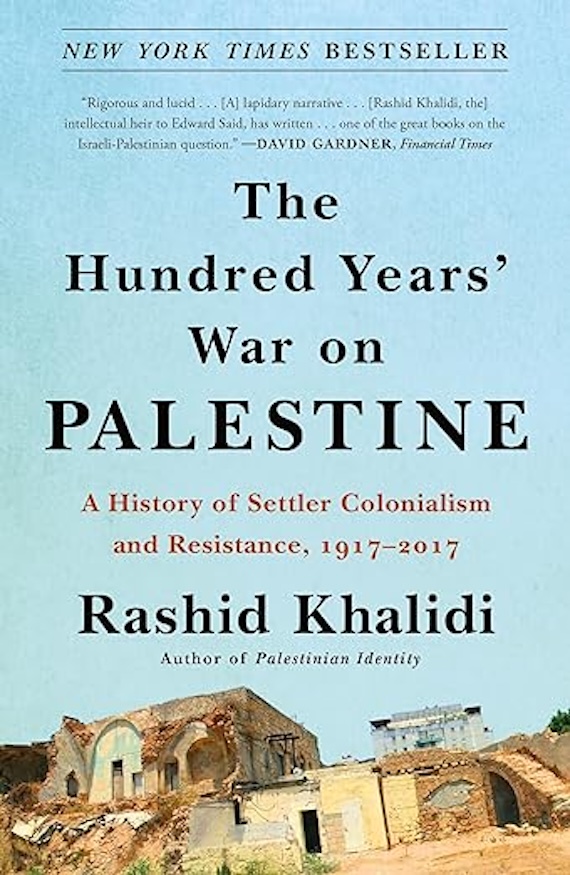If I must die,
You must live
To tell my story
To sell my things
To buy a piece of cloth
And some strings….
– Refaat Alareer, Palestinian writer, poet, professor and activist, killed in an Israeli air strike in Gaza on December 6, 2023
Interview by Fariba Amini
Professor Rashid Ismail Khalidi is the Edward Said professor Emeritus of Modern Arab Studies at Columbia University. He is the author of several books, among them The Iron Cage, Palestinian Identity, and his recent one, The 100 years’ War on Palestine. His book, Palestinian Identity, won the Albert Hourani Book Award from the Middle East Studies Association in 1997.
Professor Khalidi comes from the well-known family of Khalidis who have their roots in Jerusalem. His great-great-great- uncle was Yusuf Diya al-Din Pasha al-Khalidi who was a politician, a scholar and mayor of Jerusalem.
Realizing that a Zionist state would endanger the land of Palestine, on March 1, 1899, Yusuf Diya al-Din Pasha wrote a seven-page letter addressed to Theordore Herzl. “Unfortunately, the destinies of nations are not governed solely by these abstract conceptions, however pure, however noble they may be. We must reckon with reality, with established facts, with force, yes with the brutal force of circumstances. But the reality is that Palestine is now an integral part of the Ottoman Empire and, what is more serious, it is inhabited by people other than only Israelites. This reality, these acquired facts, this brutal force of circumstances leaves Zionism, geographically, no hope of realization.”
Professor Rashid Khalidi was kind enough to grant me this interview:
Fariba Amini (FB): Before we embark on anything contemporary, please tell us about your background. Your father was a diplomat at the United Nations. How did he influence you?
Rashid Khalidi (RK): Both my parents influenced me. They had both been involved in advocacy for Palestine, working together at the Arab American Institute in New York in the late 1940’s, before my father joined the UN. I was very much affected by following his work there in what was then the Political and Security Council Affairs division. I was also influenced by the books my parents had at home, especially my father’s books on Middle Eastern, European and US history.
FB: Two years have gone by since October 7. What happened and what is your take on the initial events?
RK: This is a topic for an entire book. It is far too early to assess the results of this war, if it is indeed over, beyond saying that it will go down in Palestinian history as an event of the magnitude of the Nakba, and that it has damaged, perhaps irreparably, Israel’s vitally important international image. The veil that has hidden the true nature of the Zionist project was shredded for good, at least for a generation that has watched two years of live-streamed genocidal butchery. They will never believe that Israel’s is “the most moral army in the world” or other deeply ingrained myths disseminated by the Western media and political elites.

Juan Cole
P. O. Box 4218,
Ann Arbor, MI 48104-2548
USA
(Remember, make the checks out to “Juan Cole” or they can’t be cashed)
FB: The received wisdom in the West is that the failure to come to an agreement is always the Palestinians’ fault and that they did not want to come to the negotiation table. You were an adviser to the PLO. What happened at the Oslo Peace Accord? Which party did not want to make peace? Or were they both at fault?
RK: I was an advisor to the delegation that went to Madrid and Oslo, not to the unqualified delegates the PLO later sent to Oslo. The PLO was eager for an agreement, probably too eager, and they fell into a trap that led to an intensification of occupation and colonization, not their removal, and postponed indefinitely self-determination and statehood. Israel’s position was summarized by Rabin’s last speech before he was assassinated for going too far with the Palestinians. He said he was offering them “less than a state,” and that Israel would maintain its security control over the occupied territories. That was a deal that led to the miserable reality the Palestinians have lived in ever since Oslo.
FB: You criticize the PLO. What is your criticism of the Palestinian movement leadership?
RK: I have written an entire book that details the failures of Palestinian leaderships, including the PLO, so I have many criticisms. One is accepting the Oslo deal. Another was failing to understand the degree of American bias in favor of Israel and its unreliability, indeed its total unsuitability as an intermediary. Yet another was the failure to do the vital informational and diplomatic work with the American and European publics in order to influence policy from below, which is a very difficult thing to do, but one they never did. There were other failures, but also achievements like reunifying the Palestinians after the Nakba, and putting them back on the global map.
FB: To call Hamas a terrorist organization is to simplify a complex struggle. Where did Hamas go wrong? Who was responsible for such a terrible decision on October 7?
RK: Resistance movements are an inevitable response to colonization and occupation, and are always labeled “terrorist” or “bandits” or “criminals,” as if their violence is worse than the infinitely greater violence of the colonist and the occupier. That said, resistance can be strategic and intelligent, or un-strategic and self-defeating, and it can involve nonviolent, diplomatic and informational tactics as well as violent ones. It is too early to do a complete post-mortem on the decisions around October 7, although it is clear that grave mistakes were made, which gave Israel the pretext to carry out a genocide for two years with complete impunity, mistakes for which the people of Gaza have paid very dearly.
FB: We are now at a crossroad after 2 years of genocide against the people of Gaza. Watching famine and endless displacement, the destruction of 92 percent of Gaza, the world has come to realize the extent of the atrocities. Israel has lost a great deal of legitimacy and most Western governments now support the creation of a Palestinian state. Why now and why not before?
RK: What Israel has done is unprecedented in the history of this struggle. It has killed and wounded over a quarter million people, more than 12% of the population of the Gaza Strip, intentionally targeting civilians under the lying pretext that they were “human shields.” These war crimes were live-streamed for an entire generation: this has irreparably shredded Israel’s reputation, and increased sympathy for the Palestinians. Under pressure from their publics, Western governments and Arab regimes called for creation of a Palestinian state, which in itself is meaningless without a complete end of occupation and colonization. Nevertheless, this step added to the global pressure that forced Israel to end the war without achieving its main aim, which was to force as much as possible of its population out of the Gaza Strip, continuing the ethnic cleansing of 1948 and 1967.
FB: How deep Israel finds itself in? Is Israel a broken society, as one of my friends from Israel put it?
RK: I do not know if it is a broken society, but it has certainly gravely undermined the support from its Western metropole without which a settler colonial project like this cannot possibly survive.
FB: Do you see this new peace accord as real or is it is wishful thinking?
RK: It is not a peace accord. It is a ceasefire accord, a hostage exchange, and a temporary lifting of the blockade of Gaza, which may be followed by other steps, but which does not contain any of the elements of a real peace deal. That would necessarily be based on completely equal rights for all individuals and both peoples, under whatever configuration is ultimately agreed upon.
Never miss an issue of Informed Comment: Click here to subscribe to our email newsletter! Social media will pretend let you subscribe but then use algorithms to suppress the postings and show you their ads instead. And please, if you see an essay you like, paste it into an email and share with friends.

“Gaza,” by Fariba Amini.
FB: What will become of the people of Gaza after two years of this devastating war? Gaza is destroyed. Who is going to reconstruct it?
RK: No one can say at this stage. Israel has intentionally made Gaza unlivable in order to force the population to leave. Many things have to happen before the basic amenities of life can be restored: water, sewage, electricity, schools, hospitals, so much else. There are so many unknowns before that process can begin, let alone rebuilding of everything else that has been purposely destroyed.
FB: And what about the West Bank?
RK: Israel has the same long term intentions regarding the West Bank as it had for the Gaza Strip: depopulation and absorption. That process is still ongoing there, and there is no guarantee that it will not resume in Gaza at some point.
FB: Who will rule the Palestinian people? Some foreign entity or a real Palestinian governance?
RK: The plans so far proposed would install what amounts to a new foreign mandate over Palestine while perpetuating overall Israeli control, and would postpone yet again the self-determination the Palestinians have been denied since 1917. The Palestinians will resist this as they have resisted the Mandate and occupation.
FB: You are the Edward Said chair at Columbia University. He said at one time that there should be one state for Israelis and Palestinians. Do you think that is even possible?
RK: I am the Edward Said Professor Emeritus. I retired in 2024. Such an outcome is one of several that may be possible, but it will take a long time to achieve something like that, and it would require major changes: decolonization and a settlement based on justice and completely equal rights for all. That in turn will require shifts in the global and local balance of forces; the emergence of a unified Palestinian national movement with a clear strategy that it can articulate to the world; and major shifts inside Israel, including the realization that it is impossible to impose forcibly a 19th century colonial settler project on an indigenous people in the 21st century.
FB: You have now retired from Columbia University but you were going to teach a class or classes on the conflict. What made you change your mind?
RK: I was going to teach a course on modern Middle Eastern History, as I have done for over two decades, including once after I retired. I decided that I could not do that after Columbia capitulated to demands by the Trump administration. The most important of them was acceptance as a basis for disciplinary action of the International Holocaust Remembrance Alliance definition of antisemitism, which was essentially drafted to protect Israel from criticism. On that basis, several topics I teach about in that course became susceptible to ill-founded, meretricious complaints of “bias” that would have led to endless disciplinary proceedings in the kangaroo courts that Columbia has used to discipline and punish speech on Palestine.



 © 2026 All Rights Reserved
© 2026 All Rights Reserved